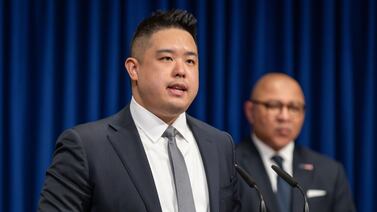A bill to repeal a state mandate that 11th graders in New Jersey pass a statewide proficiency test to graduate high school got another green light from lawmakers Monday.
Critics of the exit exam argue that research shows standardized testing is not an accurate way to measure a student’s knowledge. They point to studies showing graduation exit testing isn’t a good predictor of how ready a student is for college, and say the testing unfairly hurts students of color and children from low-income families.
“I would agree we need some sort of measure, but we — as the legislative body, as a state, as administrators and representatives — should ensure that this measure truly tells us the quality of the educational program that the student is receiving, not the wealth or poverty or where they’re coming from,” said Jamil Maroun, Manville’s schools superintendent.
The Assembly Community Development and Affairs advanced the bill unanimously, and it now heads to the full chamber for a vote. An identical bill in the Senate awaits a committee hearing.
At Monday’s committee meeting, school administrators and education advocates wondered why schools are still required to administer the test as more states lift the requirement — and as New Jersey itself has not counted the exam since 2019.
New Jersey has required students to pass a standardized test to graduate high school since 1980, and is one of only a handful of states that still require it. New Jersey called off the test in 2020 and 2021 because of the pandemic, and last year juniors took the exam but did not have to pass it to graduate this year.
If students don’t pass it, they can still graduate by submitting a portfolio with their grade point average and results from another qualifying test, like the PSAT.
Education officials testified that students who have passed another test may not put in the effort to pass the proficiency exam, leading to hours of lost educational time in the classroom. Meanwhile, students who will not pass the exam are still forced to sit for hours to take it just to fail, they said.
Krista Whitaker spoke of her two sons, both of whom have Individualized Education Programs. Whitaker said her oldest son excels on regular classroom tests when provided with modifications like extra time and verbal guidance, but that help is not allowed for the high school proficiency exam, effectively forcing him to take a test he doesn’t understand and can’t pass.
“As of right now, my son cannot graduate next year,” Whitaker said.
According to the National Center for Fair and Open Testing, students from communities of color disproportionately fail high school graduation exams, creating hurdles for students seeking scholarships or shutting them out of college admissions entirely, contributing to the racial gap in high school graduation rates and college enrollment.
Opponents of the measure passed Monday say the test is even more critical in light of school disruptions during the pandemic. Althea Ford of the New Jersey Business and Industry Association said the test provides data to “assess the impact that the pandemic is having on our schools and children.”
Ford said weakening testing requirements could lead to a diminished workforce in the future because of lower standards to graduate. The state’s consistently high ranking for education is what attracts businesses to the Garden State, she said.
Paula White, executive director of education advocacy group JerseyCAN, also emphasized how testing offers a standardized way to measure proficiency in 11th grade. It would be a “detriment” to underserved students to do away with a data point that keeps school districts and teachers accountable, she said.
“Information is not an indictment … we have to stop putting our heads in the sand regarding information that we simply do not want to know,” she said.
Sophie Nieto-Muñoz is a reporter for New Jersey Monitor, where this story was first published. Sophie speaks Spanish and is proud to connect to the Latinx community through her reporting.








